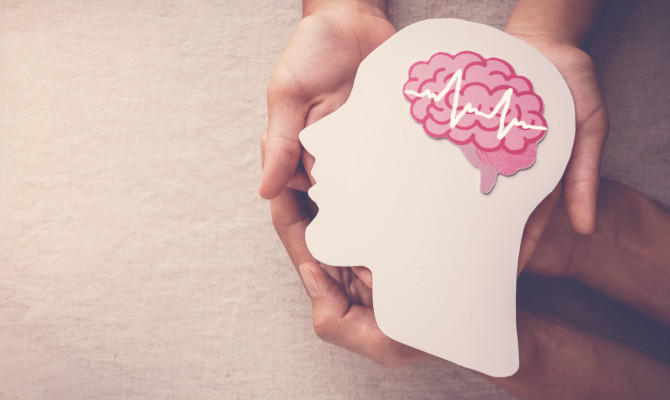Dizziness : Causes and Management

- Dizziness
- 14 Aug 2023
Overview
What is Dizziness?
Dizziness can refer to a wide variety of sensations, including unsteadiness, wooziness, weakness, and fainting. It’s quite common and it might happen to anyone. Rarely does it indicate a major issue. The symptoms of dizziness can be treated easily.
Based on the patient’s history, it was formerly classified as either vertigo, disequilibrium, lightheadedness, or presyncope. However, there is no therapeutic value in distinguishing between these symptoms. Patients have trouble expressing the nature of their symptoms but are often reliable at identifying symptom onset and duration.

Causes
Common causes of Dizziness
When blood flow to the brain is compromised, dizziness can occur. This may happen if:1Causes| Researched based study from Aafp.org
- Your blood pressure drops unexpectedly.
- Dehydration can occur from excessive loss of bodily fluids due to sickness (vomiting, diarrhea, fever, etc.).1Causes| Researched based study from Aafp.org
- You are constantly getting up too soon after resting (this is more common in older people).
- The common cold, allergies, low blood sugar, and the flu can all bring on a feeling of faintness.
Some of the most significant causes of dizziness are
- Conditions affecting the heart, such as an irregular heartbeat or a heart attack
- A Stroke
- Internal hemorrhaging Shock (extreme drop in blood pressure)
- Chest discomfort, a sense of a racing heart, a loss of speech, a change in vision, or other symptoms may be present if any of these illnesses are present.1Causes| Researched based study from Aafp.org
Peripheral causes of Dizziness
Benign Paroxysmal Positional Vertigo
- Canaliths, or loose otoconia, are responsible for BPPV when they find their way into the semicircular canals.1Causes| Researched based study from Aafp.org
- In the therapy of BPPV, pharmaceuticals are not used. Medication that suppresses the vestibular system may increase the risk of falling because it might disrupt central compensation.
Vestibular Neuritis
The second most prevalent cause of vertigo, called vestibular neuritis, is believed to have a viral origin. It can result in
- Horizontally rotating spontaneous nystagmus on the unaffected side
- An irregular gait with a tendency to fall on the affected side
- Severe rotatory vertigo accompanied by nausea and the apparent movement of objects in the visual field (oscillopsia). In this situation, there is no loss of hearing.1Causes| Researched based study from Aafp.org
Treatment of Vestibular Neuritis
- Medication and vestibular rehabilitation are used to treat vestibular neuritis.
- Due to their effects in preventing central compensation, antiemetics, and antinausea drugs should be administered for no more than three days.
- Combinations of antihistamines, antiemetics, and benzodiazepines are often used to treat vertigo and its accompanying nausea and vomiting.
- While systemic corticosteroids are recommended as a therapy for vestibular neuritis, there is inadequate evidence for their frequent usage.
- Antiviral drugs do not have any therapeutic effect in this condition.
Meniere Disease
- Vertigo and hearing loss in one ear characterize Meniere illness.
- The dizziness and imbalance caused by Meniere’s illness are so severe that bed rest is usually recommended.1Causes| Researched based study from Aafp.org
- Slips or falls, as well as a worsening of preexisting hearing loss and a headache, are additional symptoms.
- Inner ear dysfunction due to increased pressure in the endolymphatic system is the underlying disease, however, its source is unclear.
- During attacks of vertigo, patients show horizontal-torsional nystagmus in just one direction.
Treatment of Meniere Disease
- Changing one’s lifestyle is the first line of defense against Meniere’s disease.
- If vertigo persists despite lifestyle changes, a daily thiazide diuretic may be added to the treatment plan.
Otosclerosis
- Sudden attacks of vertigo accompanied by conductive hearing loss due to aberrant middle ear bone development.
Central causes of Dizziness
Vestibular Migraine
Patients who have a history of migraine headaches and have episodes of vertigo may be suffering from vestibular migraine. Its diagnostic criteria are 1Causes| Researched based study from Aafp.org
- At least five attacks of moderate or severe vestibular symptoms lasting anywhere between five minutes to 72 hours meet the diagnostic criteria for vestibular migraine
- Along with a current or past history of migraine headache, at least one migraine feature, and a minimum of 50% with vestibular symptoms.
Treatment of Vestibular Migraine
- Migraine sufferers should first learn to recognize and avoid the things that set off their attacks.
- Rest, relaxation techniques, and physical activity can help reduce stress.
- Medication that reduces vestibular activity is useful like anticonvulsants, calcium channel blocks, beta-adrenergic blockers, tricyclic antidepressants, magnesium,and butterbur extract
Basilar Vertebral Ischemia
- The vertebrobasilar system is the source of blood for the brainstem, cerebellum, and cochlea.
- Vertigo can be brought on by the blocking of a main branch.
- Diplopia, weakness, dysarthria, or clumsiness of the limbs are all symptoms thought to originate in the brainstem, and their presence or absence can help doctors make a diagnosis.1Causes| Researched based study from Aafp.org
Treatment of Basilar Vertebral Ischemia
- Antiplatelet therapy and lowering risk factors for cerebrovascular illness are both part of the treatment plan.
Posterior fossa and cerebellopontine angle meningiomas
- Persistent attacks of vertigo that don’t respond to treatment due to a condition like a neurofibromatosis, medulloblastoma, a brainstem glioma, an auditory neuroma, or an infratentorial ependymoma.
Other factors responsible for Dizziness
Psychiatric
- A psychiatric disorder characterized by recurrent episodes of dizziness that cannot be explained by any physical reason. (e.g., anxiety, depression, bipolar disorder)
The effects of medication
- Repeated episodes of dizziness with no apparent explanation may be an adverse effect of a medicine.
Metabolic and cardiovascular
- Symptoms that occur suddenly and aren’t caused by anything in particular.
Orthostatic
- Symptoms that occur suddenly and are triggered by going from a seated or lying posture to an upright one.
Diagnosis
Diagnosis of Dizziness
Patients presenting with dizziness often have normal findings from the physical examination, which includes a cardiac and neurologic assessment and a thorough examination of the head, eyes, ears, nose, and throat.
Physical examination
- The patient’s blood pressure should be taken both when they are standing and while they are lying flat on their back.
- The Romberg test should be administered after observing the patient’s walk. If a patient walks erratically, it is important to rule out peripheral neuropathy.
- Examinations like the HINTS (head-impulse, nystagmus, test of skew) can differentiate between a central cause like a stroke and a peripheral one like acute vestibular sickness. 1Diagnosis| Researched based study from Aafp.org
- Skewness Check: In order to do the skew test, the doctor will have the patient stare straight ahead before covering one eye and then the other. If the covered eye moves upward or downward after being revealed, that’s not typical. A negative result is very specific for brainstem involvement, despite the test’s lower sensitivity for central disease.
Laboratory Measurements And Tests
Laboratory testing is unnecessary for the vast majority of people who have dizziness.
- Blood glucose and electrolyte measures are sometimes necessary for patients with long-term illnesses (such as diabetes mellitus or hypertension).3Lab tests | Researched based study from Medlineplus.gov
- Electrocardiograms, Holter monitoring, and perhaps carotid Doppler tests should be performed on patients whose symptoms are indicative of heart illness.3Lab tests | Researched based study from Medlineplus.gov
Imaging procedures
- Normal imaging procedures are not warranted. However, CT or MRI scans are needed to rule out cerebrovascular illness in cases of asymmetric or unilateral hearing loss or any other aberrant neurologic result.
Management

Medical Management and Treatment
Self Care
- If you become dizzy when you rise up from a sitting or lying position 2 don’t make any extreme stance alterations.
- If you must get up from a lying position, do so carefully and sit for a few seconds before getting to your feet.2Management | Researched based study from healthdirect.gov.au
- If you must stand, secure yourself with a handhold.
If you suffer from vertigo, the following advice may help alleviate your condition.
- When symptoms appear, be calm and rest.
- Try not to make any quick alterations to your position.
- Intensify your efforts gradually.
- When experiencing vertigo, you may find that you require a cane or other assistance to get around.2Management | Researched based study from healthdirect.gov.au
- During incidents of vertigo, activities like looking at a bright screen, reading, or watching TV may aggravate your condition.
- Until your symptoms have completely subsided, you should hold off on driving, operating heavy machinery, and climbing. A sudden attack of dizziness while such activities might have serious consequences.2Management| Researched based study from healthdirect.gov.au
Medication
- Antihistamines like Diphenhydramine and Promethazine
- Benzodiazepines like Diazepam, Lorazepam and Clonazepam
- Anticholinergic drugs like Hyoscine hydrobromide
- Antiemetics drugs Prochlorperazine and Metoclopramide 4Medication | Researched based study from Nps.org.au
- Prochlorperazine and/or betahistine are often prescribed to patients with chronic or recurrent vertigo, despite a lack of data supporting the medications’ long-term usefulness.4Medication | Researched based study from Nps.org.au
- Acute vertigo medication should be used with caution since it may hinder vestibular adaptation.
- Although not thoroughly investigated, selective serotonin reuptake inhibitors like sertraline may have a role in the treatment of vertigo. 4Medication | Researched based study from Nps.org.au
Prevention
Prevention of Dizziness
- Try to avoid or cut back on using tobacco, coffee, and salt. These products enhance dizziness because they slow blood flow.
- If you’re going on a flight, try to get a seat in the middle of the plane, as far away from the wings as possible.
- Choose the passenger seat of the car especially when traveling long distances. You’ll be better able to prepare for and adapt to future movements as a result. 5Prevention | Researched based study from Nhs.uk
Consultation
When should you consult a doctor for Dizziness?
If you are dizzy and also have the following symptoms, you should visit a doctor: 2Emergency | Researched based study from Healthdirect.gov
- Trouble seeing with one or both eyes
- Nausea, cold sweats, shortness of breath
- Numbness or weakness in the face, arm, or leg
- Chest discomfort, pressure, heaviness, or tightness Jaw pain, ear ache, or back pain
- Trouble talking, comprehending, or swallowing
- Disorientation or loss of consciousness
- If you experience a fall for no apparent reason, are concerned about your dizziness, or if it is abrupt, severe, protracted, or reoccurring, you should make an appointment with your doctor. 2Emergency | Researched based study from Healthdirect.gov
Takeaway
Key Takeaways
Dizziness refers to a spectrum of feelings, including faintness, wooziness, weakness, and unsteadiness. Vertigo is a type of dizziness characterized by a mistaken perception of movement or spinning, either in the sufferer or their surroundings.
One of the most prevalent complaints from adult patients is dizziness. Constant dizziness or frequent episodes of dizziness might have serious consequences. However, dizziness seldom indicates anything serious.
The reason and severity of your symptoms will determine how you treat your dizziness. Most peripheral causes are harmless. Urgent care is typically necessary for central causes. Examinations like the HINTS (head-impulse, nystagmus, test of skew) test can help rule out peripheral causes and zero in on central ones.
Any feedback on this article?
 This Articles content was accurate
This Articles content was accurate Very Informative Article
Very Informative Article I have a question or a comment
I have a question or a comment
 This article contains inaccurate content
This article contains inaccurate content This article was not helpful
This article was not helpful I have a question or a comment
I have a question or a comment
We appreciate your helpful feedback!
Checkout our social pages
References
-
American Academy of Family Physicians
Dizziness: Approach to Evaluation and Management | Causes | Management
-
Health Direct
Dizziness | Emergency
-
Medline Plus
Dizziness | Lab tests
-
NPS MedicineWise
Dealing with dizziness | Treatment
-
National Health Services
Dizziness | Prevention





































